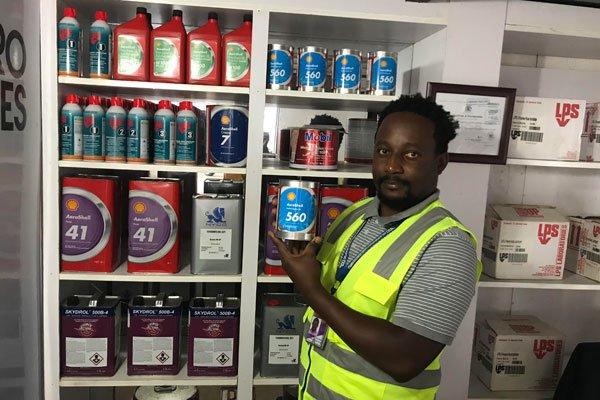Africa-Press – Uganda. When I meet Lucky Jesse Kwesiga at one of the aircraft maintenance hangars at the Entebbe old airport, he is having a conversation with one of the aircraft technicians repairing an aircraft.The technician is explaining to Kwesiga about the purpose of one of the aircraft parts. When he is not visiting other people’s stations. Kwesiga can be found at his lubricants shop locatedin the nose of the hangar known as Aero Lubes which he started in 2016.
During a side conversation, Kwesiga says majority of the planes in the hangar are Cessna caravans. These are the most popular air crafts operated in Uganda whose engines are called turbo props.This means they are turbo engines but with propellers. Kwesiga narrates that these planes use different kinds of engine oil but that the most common is called B2380, while some aircrafts use Aero Shell 560. According to Kwesiga, the B2380, one of the lubricants he sells, moves very quickly because it is the most preferred among aircraft operators. However, he says he practically stocks these lubes and lubricants according to the demand.
Small aircrafts such as the Cessna 172 that runs on a piston turbine engine uses W100+ oil while helicopters such as the MI8 use Mobil Jet two. At his shop, Kwesiga also has greases because there are aircrafts that have hydraulics that need greasing. These aircrafts also have bearings in the tyres where you expect friction, which is where greases come into play. These include Aero shell grease 7, grease 22 and 33, among others.
Kwesiga says stocking these greases is determined by the planes operated around the area and what kind of consumables they may need.The journey for the Aero Lubes enterprise, Kwesiga recalls, started in 2016, although incorporating it as a company came in 2019.“I first operated it as a sole trader. I would get orders from different aircraft operators from 2016 to 2018 and board a night bus to Nairobi because there was no company in Uganda that stocked or dealt in aero lubricants,”Kwesiga says.
Until 2016, Kwesiga worked with Kampala Executive Aviation (KEA) that chartered domestic, regional and international flights and it was where Kwesiga served in many capabilities. He served as the Line and Outstations Manager after serving as the Entebbe Station Manager for years.While at KEA, he realised there was need for aero lubricants by aircraft operators who would often make orders from Dubai through his employer. This is where he drew his inspiration to start the aero lubricants business.
“Some operators had stores but would run out of lubes and become stuck. I saw a need. I would go to them ahead of time and get on a night bus to Nairobi, look and source for different aero lubes and bring them to Uganda and distribute to different operators at a cost,” he adds.
Along the way, this mode of operation was not sustainable. It was at this point that Kwesiga saved capital of Shs60m to start Aero Lubes in 2016 after quitting his job. He later saw the need to incorporate Aero Lubes as a limited company to ease trade. The Shs60m was used to secure stock, branding, securing premises and shelving it to set up a shop and registering the business.
At Aero Lubes, most products are sold in dollars. For instance, a box of Fluid 41 costs approximately $600 from Narobi, while a two-kilogramme tin of Mobil grease costs $500, which is approximately Shs1.6m. When business is good, Kwesiga makes approximately $30, which is about Shs111,000 per box sold. The more the traffic, the more profit he makes. When business is not at its peak, Kwesiga says he just wants to clear stock to pay rent and salaries and that this drops the profit margin to as low as $20 (approximately Shs74,000) per box.
However, to source for products cheaply, Kwesiga is in the final process of getting supplies from Dubai and this means they will arrive much cheaper.“When I source from Nairobi, there is an issue of double taxation. When the dealers in Nairobi import, they are taxed in their country. When I buy them from Nairobi, I am taxed because Ugandan tax authorities claim the product is not made in Uganda, neither in East Africa. By the time I bring it to the shop, the overheads are way beyond and it becomes unfavourable for the operators. Because of such hardships, I made a partnership with a company in Dubai to supply me with stock,” Kwesiga explains.
“Aero lubes and lubricants is a highly capital intensive business and the returns are slow. In aviation, planes are not like cars that break down every day. The standards and maintenance are very high and aircrafts are only serviced according to schedules because there are minor incidences where a plane experiences a break down,” he adds.To succeed in the aviation business, Kwesiga says you have to be ready and willing to invest the money and be patient. If you are looking for a get rich quick business, this is not it because you will not recoup returns on investment within a short time. Realising profits happens over time.
Customer base
Aero Lubes is located in the aircraft maintenance hangar at the old airport where many operators service their planes next to Kwesiga’s shop. This, he says, has been key in attracting and building his customer base.
“Everybody who will land at Entebbe and most of the operators in the country will have to service from any of the three hangars at Entebbe. It gives me an opportunity to reach out to new, old and existing operators about my stock. They may not buy the first time because some come with their own products but will buy the next time because they now know there is a shop to meet their needs,” Kwesiga says.Besides the airport hangar, Kwesiga also goes out to different operator air bases, for instance at Kajjansi at Kampala Aero Maintenance to market his products. Some other clients also support the business through referrals from Rwanda, DR Congo, and other places.
Challenges
Like any other business, Aero Lubes is not run without challenges. The main one is from tax authorities. It is a highly capital intensive business where Kwesiga is not in position to import directly from Dubai where he would need approximately Shs200m for one consignment. This leaves him with Nairobi as the only source of his products.
“Getting everything from Nairobi would be fine but we are double taxed. When we face double taxation, it means our products reach Uganda when they are much more expensive than what it is on the market.This effect goes down to the clients because when they come to buy a box of a product at $650 (approximately Shs2.4m) yet they know it costs $600 on the market, they will hesitate. I would be left with no choice to selling it at $650 to survive, and this is where most clients prefer importing for themselves,” Kwesiga narrates.
The second challenge is that the business is capital intensive. This means it is not able to grow or expand at Kwesiga’s desirable rate. Lately, the shop is worth between Shs20m to Shs30m, which Kwesiga says is approximately 10 percent of what he needs to have. If he is to stock up fully, he would need about Shs250m.
Future plans
One of the immediate plans Kwesiga says he is working on is getting into a supply agreement with one of the biggest aero lubricants distributor in Dubai. This, he expects, will help him expand his stock and thereafter focus his energies towards being Uganda’s preferred aviation lubricants supplier in the next two to five years.And once he has satisfied the Ugandan market, he will focus on the East African region that boasts of a virgin industry in South Sudan, DR Congo, Burundi and other neighbouring countries.
Advice
Every business is set up to make money but Kwesiga advises that it should not be your priority in the aviation business. Aviation lubricants is a business where you have to want to supply a product or to solve an aviation problem before looking at the need to make money. It should be something that will come as a result of the passion you have for the business.
Values
According to Kwesiga, one of the important values to stand by in the aero lubricants business is passion. He has learnt this from his 10-year experience and knowledge of the aviation industry.“Aviation is a complicated expensive industry. Without passion, you are not going to push any product in aviation. All the other factors are very challenging. You also have to be client-oriented. The requirements of the client are what I strive to meet. I focus on the client and hear them out. I make research and identify the current problem in the aircraft maintenance business and find a solution for that and it is what has endeared me to my clients,” Kwesiga says.
For example, Kwesiga has a list of other consumables apart from lubricants and greases he has been putting together to include in his next stock. These are particularly sophisticated wiping tissues because he sees aircraft engineers suffering with them yet there is nowhere they can get them in Uganda.
Positioning for growth in the fast-changing lubes market
Lubricants remain an attractive—but also challenging—business in the short term. Value growth is not evenly spread, and suppliers will need to design strategies that ensure access to growth areas.Most global value growth from 2025 to 2035 is expected to come from rising margins, which are largely dependent on a switch to branded, synthetic lubricants in the road-transport sector. It would be wise to focus on the development of these products—especially in the fast-growing emerging markets in Africa, Asia, and Latin America.
To optimise portfolios, premium players should emphasize Research and Development (R&D) and improved technology capability for specialised, high-performance, or synthetic products. To ensure volume growth, companies may wish to pursue new market entries, mergers and acquisitions, and development of new assets. This could involve leveraging distributors or affiliates to help penetrate new markets; alternatively, the company’s existing businesses may be the best platform for entry.
Digital-marketing efficiency can be enhanced by coordinating advertising across business units and using advanced analytics to identify and overinvest in priority segments. Today, and increasingly in the future, it is also essential to develop expert content-marketing and social-media capability, with larger budgets for business-to-business (B2B) technical sales and less for business-to-consumer (B2C).
Preparing for the challenges
The strategy also needs to mitigate the impact of disruptive change. For example, companies can hedge against faster battery-cost reduction by improving access to non-battery electric-vehicle (EV) growth markets and by developing specific EV products, such as specialized battery coolants.To meet the rising B2B challenge, companies will need to depend increasingly on a lubricants-plus offer, involving value-adding services and greater customer engagement that build customer loyalty and intimacy. To make sure this is achieved efficiently, companies must optimise product portfolios and routes to market, move forward with sales-channel integration, and hone digital-marketing skills to engage buyers.
The sort of added services that could be offered include remote Internet of Things (IoT)–enabled real-time monitoring of equipment and stock levels. This improves maintenance efficiency and enables vendor-managed stock optimisation while helping to increase customer intimacy.Another service is real-time used-oil analysis, which involves a sitewide fluid-management system that uses on-site sensors to analyse used-lube-oil samples. The results can be compared with a used-oil database to optimise lubricant change intervals and product selection. To offer such a service, companies must develop or obtain sensor technology and the artificial-intelligence and advanced-analytics solutions needed to analyse and compare samples successfully.Full market commoditisation can be countered to some extent by acquisitions to improve scale economies, as well as by raising operational excellence to secure margins.
Early movers
Companies need to act fast, as the competition is already investing in technology and assets to position themselves better for the value pools of the future. For example, to access growth in new markets, FUCHS has acquired seven companies—which have cumulative revenues of more than $350m —since 2010. China’s Sinopec is entering the South African market through the acquisition of a Chevron lubes-blending plant, while Shell has built high-capacity blending and grease plants in Indonesia and Singapore to support its Asian growth strategy.Examples of developing optimum routes to market include Gulf Oil International’s channel strategy, which realised 30 per cent volume growth by building an Indian distribution network.
In addition to entering new geographical markets, partnerships and acquisitions can achieve improved product offerings, as illustrated by FUCHS’s purchase of Ultrachem and industrial specialties intellectual property. Another option for today’s suppliers is to raise quality by using gas-to-liquids (GTL) plants, which produce very pure, proprietary GTL base oils.Recent moves in value-added B2B services include Peloton Technology’s fuel-efficiency and road-safety improvements, using wirelessly connected trucks that form an aerodynamic platoon.
Source: mckinsey.com.






